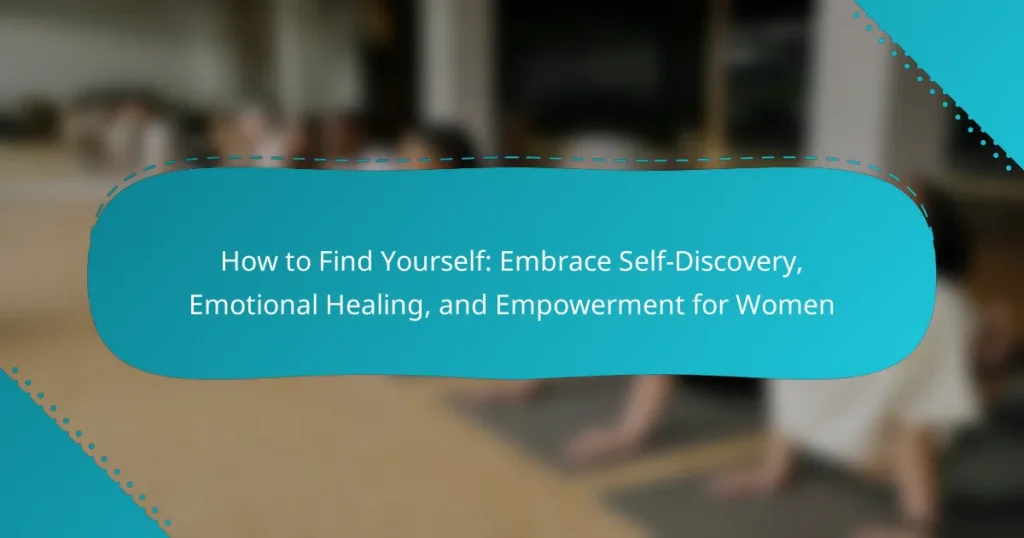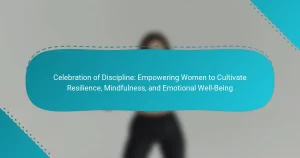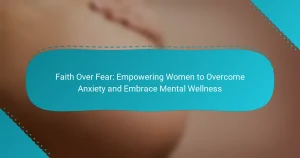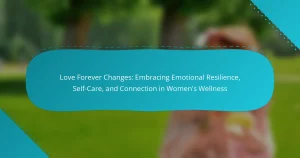Self-discovery is essential for women seeking emotional healing and empowerment. This process involves understanding personal values, strengths, and aspirations. Effective strategies include self-reflection, mindfulness, and building support networks. Addressing unique challenges can enhance resilience and foster a fulfilling life aligned with one’s true self.
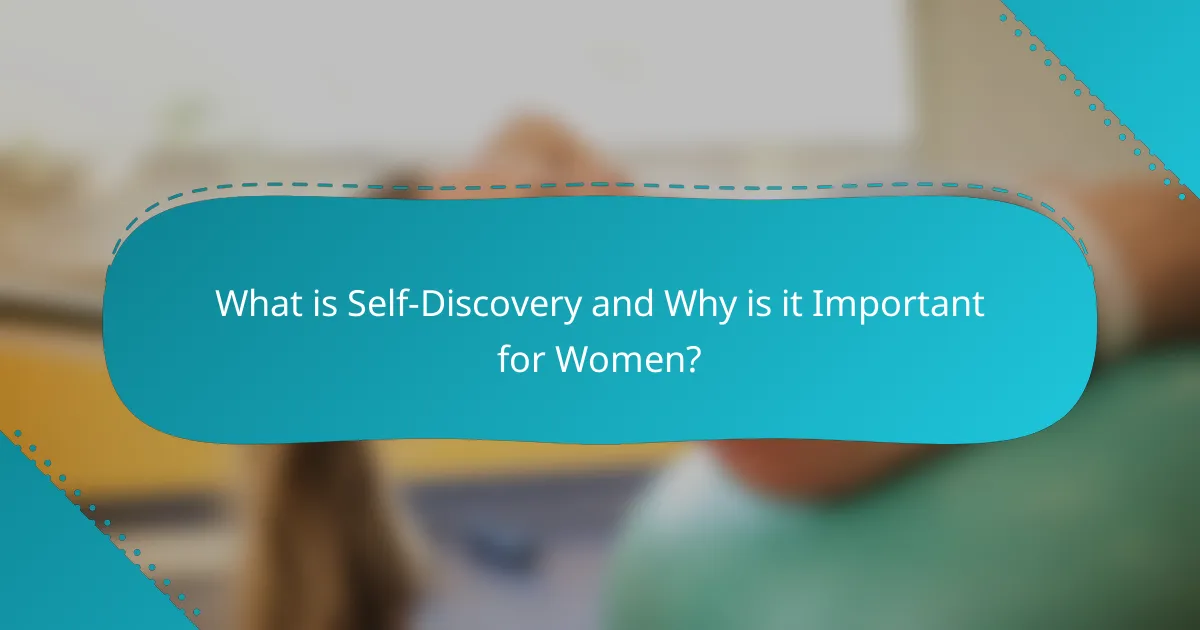
What is Self-Discovery and Why is it Important for Women?
Self-discovery is a vital process for women, fostering emotional healing and empowerment. It allows women to understand their values, strengths, and aspirations, leading to a more authentic life. Engaging in self-reflection enhances self-awareness, which is crucial for personal growth. Studies show that women who prioritise self-discovery report higher levels of satisfaction and resilience. This journey not only strengthens identity but also promotes healthier relationships and decision-making. Embracing self-discovery ultimately empowers women to lead fulfilling lives aligned with their true selves.
How can self-discovery enhance emotional wellness?
Self-discovery enhances emotional wellness by fostering self-awareness and personal growth. Engaging in self-reflection allows individuals to understand their emotions, leading to healthier coping mechanisms. This process promotes resilience, enabling women to navigate challenges with confidence. Furthermore, self-discovery cultivates a sense of purpose, which significantly contributes to overall emotional well-being. By embracing their true selves, women can experience deeper connections with others, enhancing their emotional support networks.
What are the common barriers to self-discovery?
Common barriers to self-discovery include fear of vulnerability, societal expectations, lack of self-awareness, and negative self-talk. These factors can hinder emotional healing and empowerment. Fear of vulnerability prevents honest self-reflection, while societal expectations impose limiting beliefs. Lack of self-awareness obstructs the recognition of personal values and strengths. Negative self-talk diminishes confidence, making it difficult to embrace one’s true self. Addressing these barriers is essential for women seeking a deeper understanding of themselves.
How can societal expectations hinder personal growth?
Societal expectations can significantly hinder personal growth by creating pressure to conform. This pressure often leads to self-doubt and restricts authentic self-expression. Women, in particular, may feel compelled to prioritise societal norms over personal desires, stifling their journey of self-discovery. As a result, emotional healing becomes challenging, and empowerment is diminished. To overcome these barriers, individuals must recognise and challenge these expectations, fostering a more supportive environment for personal growth.
What role does fear play in the self-discovery process?
Fear plays a crucial role in the self-discovery process by acting as a catalyst for growth. It often reveals hidden truths about oneself and prompts individuals to confront their insecurities. Embracing fear can lead to emotional healing, as it encourages vulnerability and introspection. This confrontation allows for empowerment, fostering resilience and self-acceptance. Ultimately, navigating fear transforms it from a barrier into a tool for personal development.
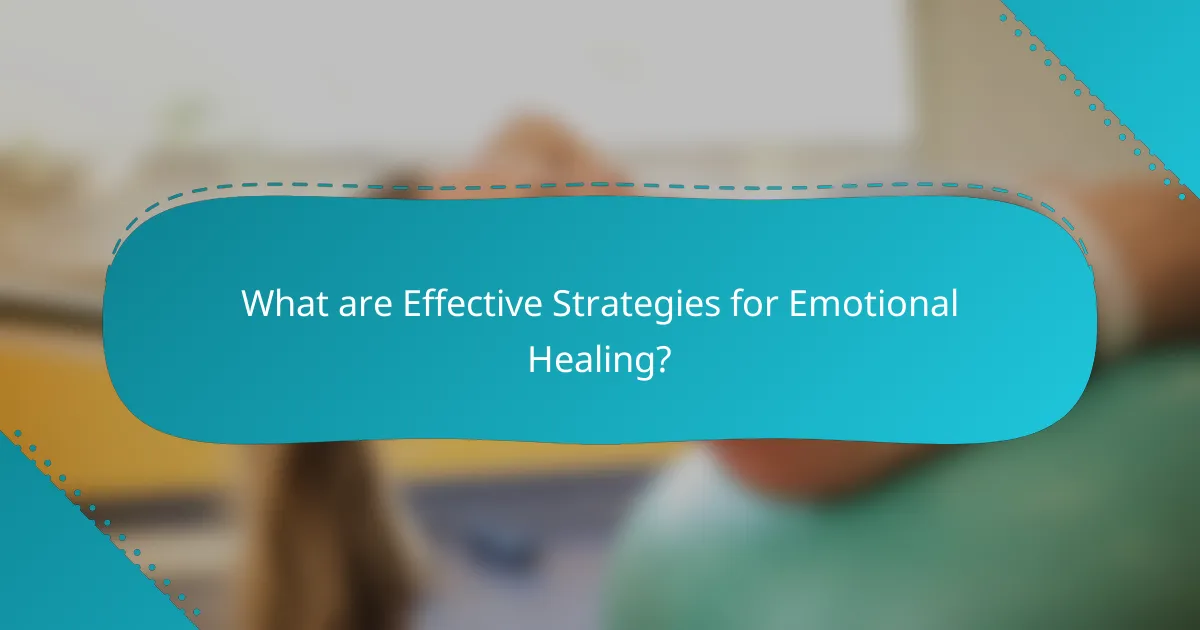
What are Effective Strategies for Emotional Healing?
Effective strategies for emotional healing include self-reflection, mindfulness practices, and seeking support from others. These methods empower women to embrace self-discovery while fostering resilience. Engaging in journaling can enhance self-awareness, while meditation promotes emotional regulation. Additionally, building a support network provides a sense of belonging and shared experience, which is vital for healing.
How can journaling facilitate emotional healing?
Journaling facilitates emotional healing by providing a safe space for self-reflection and expression. It allows individuals to process emotions, identify patterns, and gain clarity. Regular journaling can enhance self-awareness, leading to personal empowerment. Studies indicate that expressive writing can reduce stress and improve mental health.
What therapeutic practices are beneficial for women?
Therapeutic practices beneficial for women include mindfulness, therapy, yoga, and support groups. These approaches foster self-discovery, emotional healing, and empowerment. Mindfulness enhances self-awareness and reduces stress. Therapy provides a safe space for exploring emotions. Yoga promotes physical and mental well-being. Support groups offer community and shared experiences, facilitating healing. Each practice uniquely contributes to a woman’s journey of self-discovery and empowerment.
How does cognitive behavioural therapy support emotional recovery?
Cognitive behavioural therapy (CBT) supports emotional recovery by helping individuals identify and change negative thought patterns. This therapeutic approach encourages self-reflection and promotes healthier coping mechanisms. CBT empowers women to confront their emotions, fostering resilience and emotional healing. Research shows that 60-80% of participants experience significant improvement in emotional regulation through CBT.
What is the impact of group therapy on women’s mental health?
Group therapy positively impacts women’s mental health by fostering connection, reducing isolation, and enhancing emotional resilience. Participants often experience improved self-esteem and coping strategies. Research indicates that women in group therapy report higher satisfaction levels and better mental health outcomes compared to individual therapy. This communal support system encourages sharing personal experiences, which can lead to breakthroughs in self-discovery and empowerment.
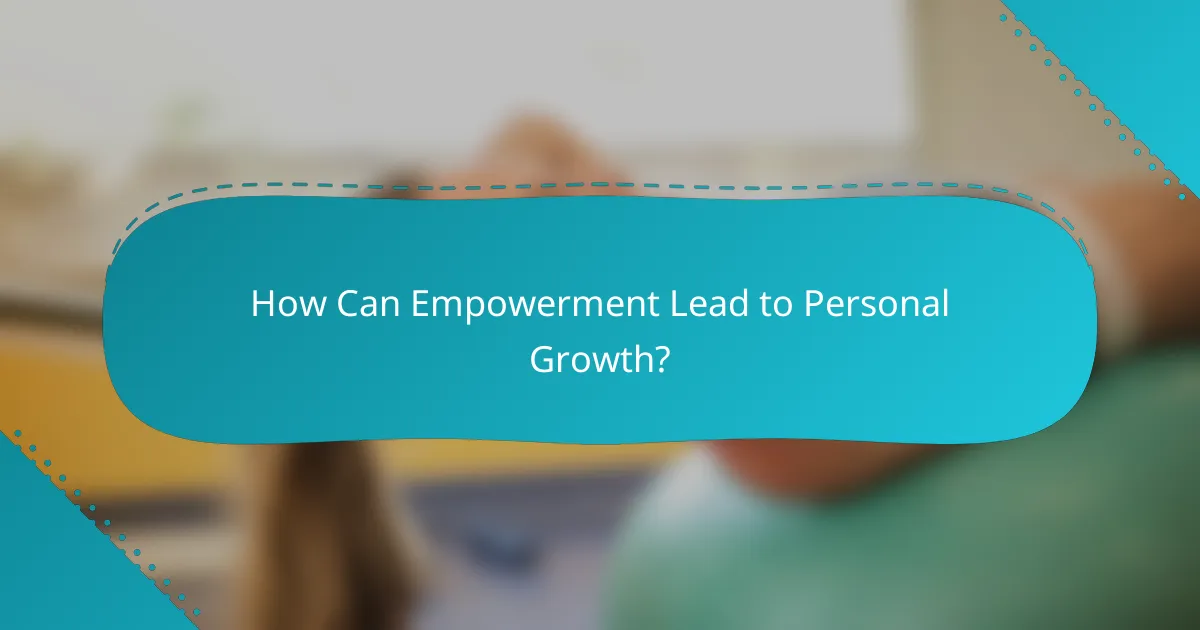
How Can Empowerment Lead to Personal Growth?
Empowerment fosters personal growth by enhancing self-awareness and confidence. When women embrace empowerment, they unlock their potential, leading to emotional healing and self-discovery. This process encourages them to set boundaries, pursue goals, and build resilience. Empowered individuals often experience increased motivation and a clearer sense of purpose, which drives continuous personal development.
What are the key components of empowerment for women?
Empowerment for women includes self-awareness, education, support networks, and advocacy. These components foster confidence and independence, enabling women to pursue their goals effectively. Self-awareness allows women to understand their strengths and weaknesses, while education equips them with knowledge and skills. Support networks provide emotional and practical assistance, and advocacy promotes equality and rights. Together, these elements create a robust foundation for empowerment.
How does self-advocacy contribute to empowerment?
Self-advocacy significantly enhances empowerment by enabling individuals to assert their needs and rights confidently. This process fosters self-awareness, leading to informed decision-making and personal growth. Women who engage in self-advocacy develop a stronger sense of identity and purpose, which contributes to emotional healing. Furthermore, self-advocacy encourages resilience, allowing women to navigate challenges effectively. Ultimately, embracing self-advocacy cultivates a supportive environment that promotes empowerment and collective strength among women.
What techniques can women use to build self-advocacy skills?
Women can build self-advocacy skills by practising assertive communication, setting personal boundaries, and seeking mentorship. These techniques empower women to express their needs and rights confidently. Assertive communication involves clearly stating thoughts and feelings without aggression. Setting personal boundaries helps define limits and fosters respect. Seeking mentorship provides guidance and support, enhancing confidence and skills. Together, these techniques cultivate a strong foundation for self-advocacy, promoting emotional healing and empowerment.
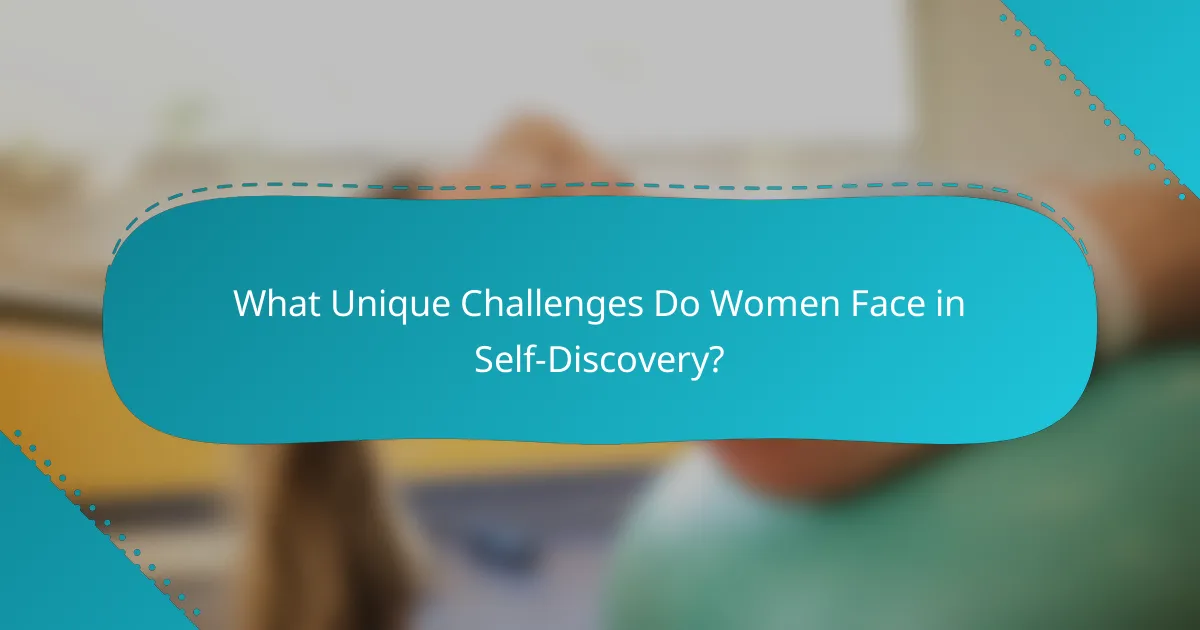
What Unique Challenges Do Women Face in Self-Discovery?
Women face unique challenges in self-discovery, including societal expectations, internalised beliefs, and lack of representation. These factors can hinder emotional healing and empowerment. For instance, women often grapple with the pressure to conform to traditional roles, which can stifle their personal growth. Additionally, many women experience self-doubt stemming from cultural narratives that prioritise others’ needs over their own. This can lead to a diminished sense of identity. Addressing these challenges requires intentional reflection and support systems that validate women’s experiences, enabling them to embrace their true selves.
How do life transitions affect women’s mental health?
Life transitions can significantly impact women’s mental health by inducing stress and uncertainty. These changes often lead to feelings of anxiety and depression, particularly during major life events like childbirth, career shifts, or relationship changes. Studies indicate that women are more likely to experience mental health challenges during these times, emphasising the need for emotional support and coping strategies. Empowering women through self-discovery and emotional healing can mitigate these effects, fostering resilience and a stronger sense of identity during transitions.
What role does motherhood play in self-identity?
Motherhood significantly shapes self-identity by fostering emotional growth and personal empowerment. It encourages women to explore their values, beliefs, and purpose. The transformative experience of nurturing a child can lead to profound self-discovery, as mothers often reassess their priorities and aspirations. This role cultivates resilience and empathy, enhancing emotional healing and personal strength. As a result, motherhood can serve as a unique catalyst for women to redefine their identities and embrace their authentic selves.
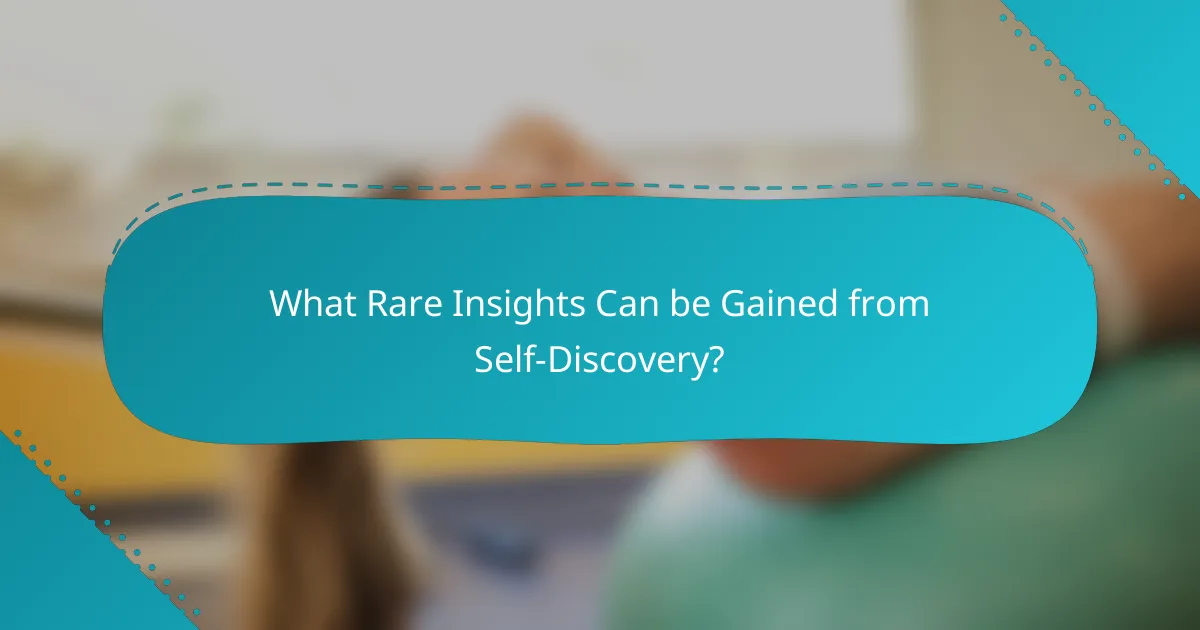
What Rare Insights Can be Gained from Self-Discovery?
Self-discovery provides rare insights into personal strengths, values, and emotional resilience. Engaging in self-reflection allows women to identify unique attributes that empower them. This process fosters emotional healing by uncovering past traumas, leading to greater self-acceptance. Ultimately, self-discovery cultivates a deeper understanding of one’s purpose, guiding women toward fulfilling lives.
How can self-discovery lead to unexpected career changes?
Self-discovery can lead to unexpected career changes by revealing new passions and strengths. Engaging in self-reflection allows individuals to assess their values and aspirations, often prompting a shift in professional direction. Emotional healing can enhance self-awareness, leading to clearer career goals. Empowerment through self-discovery encourages women to pursue paths aligned with their true selves, fostering fulfilment and success.
What are the long-term benefits of embracing vulnerability?
Embracing vulnerability offers long-term benefits such as deeper connections, enhanced emotional resilience, and improved self-acceptance. These benefits stem from authentic interactions and the courage to share one’s true self. As a result, women can experience personal growth and empowerment, leading to a more fulfilling life. Studies indicate that vulnerability fosters trust, which is essential for meaningful relationships. Additionally, it encourages emotional healing by allowing individuals to confront and process their feelings, ultimately promoting mental well-being.
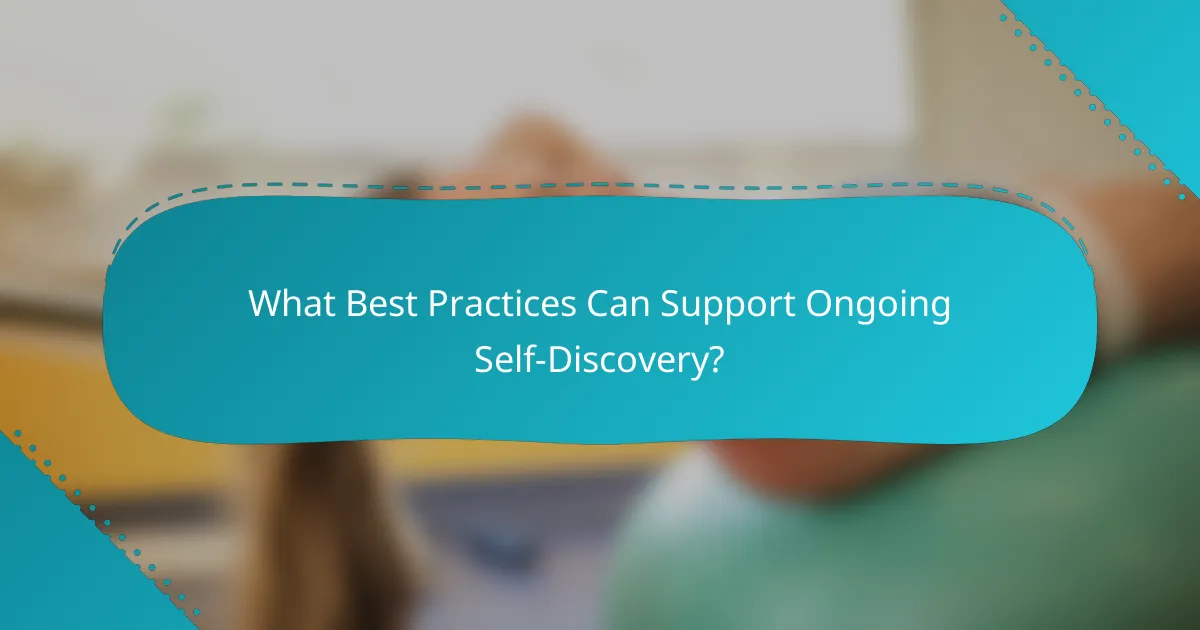
What Best Practices Can Support Ongoing Self-Discovery?
Practising self-discovery involves consistent reflection and engagement with your emotions. Journaling, mindfulness, and seeking feedback from trusted friends can enhance your journey. Establishing a routine for self-reflection promotes emotional healing and personal empowerment. Engaging in creative activities or exploring new interests can also provide fresh insights into your identity.
How can setting personal goals enhance self-discovery?
Setting personal goals significantly enhances self-discovery by providing direction and clarity. Goals create a framework for self-reflection, allowing individuals to assess their values, desires, and aspirations. This process fosters emotional healing as it encourages confronting fears and challenges. Additionally, goal-setting empowers women by promoting confidence and resilience. Research shows that individuals with clear goals experience higher levels of motivation and satisfaction, making self-discovery a more fulfilling journey.
What common mistakes should women avoid on their journey?
Women should avoid self-doubt, comparison to others, neglecting self-care, and resisting change. These mistakes can hinder emotional healing and empowerment. Self-doubt can limit growth; comparing yourself to others can undermine confidence. Neglecting self-care leads to burnout, while resisting change prevents personal development. Embracing self-discovery requires recognising and overcoming these pitfalls.
What expert insights can guide women in their self-discovery journey?
Expert insights for women in their self-discovery journey emphasise the importance of self-reflection, emotional healing, and empowerment. Engaging in practices like journaling can enhance self-awareness and clarify personal values. Seeking guidance from mentors or therapists can provide valuable perspectives and support. Additionally, joining supportive communities fosters connection and shared experiences, which are crucial for growth. Embracing vulnerability is a unique attribute that allows deeper emotional healing, promoting resilience and confidence. Ultimately, prioritising self-care and setting boundaries are essential steps in this transformative journey.
